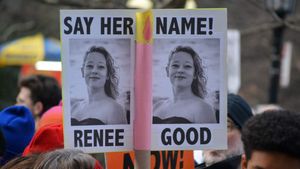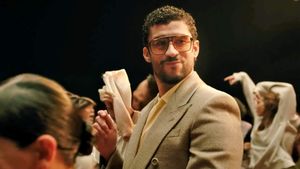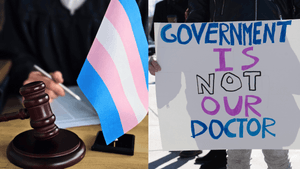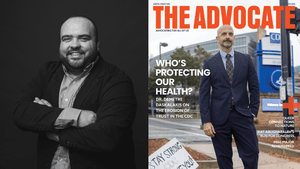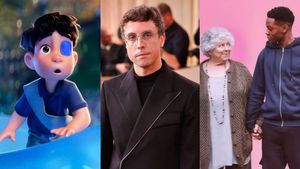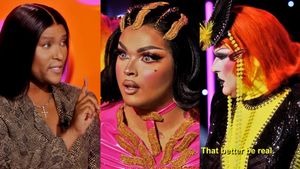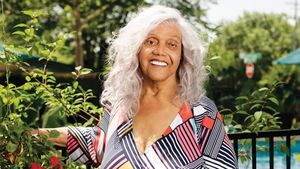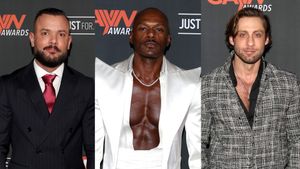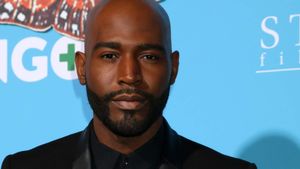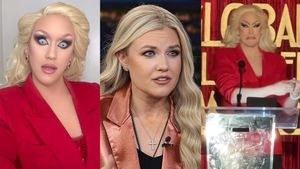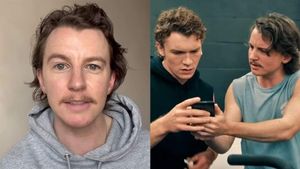Treatment GuideJust DiagnosedSex & DatingAfrican AmericanStigmaAsk the HIV DocPrEP En EspañolNewsVoicesPrint IssueVideoOut 100
CONTACTCAREER OPPORTUNITIESADVERTISE WITH USPRIVACY POLICYPRIVACY PREFERENCESTERMS OF USELEGAL NOTICE
© 2026 Pride Publishing Inc.
All Rights reserved
All Rights reserved
By continuing to use our site, you agree to our Privacy Policy and Terms of Use.
Who can forget the ghostly images of a frail Rock Hudson, smiling bravely amid the furious assault of cameras and flashbulbs to announce he had AIDS? For millions worldwide, the 59-year-old Hollywood legend became the first public face of HIV'representing the thousands of gay white men being cut down by the disease. Since that historic day in July 1985, however, the face of the epidemic has changed significantly. The new realities of HIV now include images of ethnic minorities (especially African-Americans), women, and increasingly young people, both gay and straight. Citing UNAIDS statistics, Advocates for Youth notes that half of all new HIV infections worldwide occur in people between 15 and 24 and that about one third of all people living with the disease today are in that age range. But in contrast to Hudson's reluctant admission of his infection more than 20 years ago, many of the young adults living with HIV today are willingly stepping into the public spotlight. 'Young people don't want to go away and keep their lives a secret,' says Todd Murray, 25, the executive director and cofounder of New York City'based Hope's Voice, a national organization committed to promoting HIV education and prevention messages to young adults. 'They're ready to start talking about HIV because they're not going to live with stigma and discrimination.' That kind of straightforward, open peer-level talk about the disease is sorely needed, and it could be a key factor in driving down the high HIV rates seen among teenagers and young adults, AIDS experts say. Jennifer Kates, vice president and director of HIV policy at the Kaiser Family Foundation, which works closely with MTV and Black Entertainment Television on HIV campaigns targeting youth, says educational programs that reach out to young people in 'their own voice' have the greatest impact. But, she says, with new generations of young people constantly coming of age, it is a challenge to find the right role models and the right messages that will resonate with them. And parents and schools aren't doing enough to fill that information gap, particularly in light of the growing push for abstinence-only sex education programs that leave young people unaware of how to protect themselves, says Murray, who learned he was infected at age 20. 'No one ever sat down and talked to me about protecting myself,' he notes. 'I was angry at the whole world for not educating me on HIV.' After his diagnosis, Murray dedicated himself to helping fill that HIV education void for young people. For the second straight year he's spearheaded the Hope's Voice Road to Hope tour, a traveling HIV educational program through which 14 HIV-positive young people visit high schools and colleges across the country in April and early May to talk about their experiences and to mobilize young people to act. 'The power of this tour is that we recognize that our generation is the first generation to have lived their whole lives in a world with HIV,' Murray says. 'As a result, unlike earlier generations, there's an apathy out there, a distorted idea that it's not such a big deal.' One of the featured speakers on the tour'each of whom Murray selected to represent as many different faces of the disease as possible'is Heather Johnson, 19, whose story is especially arresting because she's been HIV-positive since birth. 'I'm doing this for all the perinatally infected people out there,' says Johnson, who recently taped a public-service announcement about HIV prevention for Black Entertainment Television. 'I want to open people's eyes. After announcing my HIV status on national television, I can't turn back now. I don't want to, either.' Like Johnson, Shelton Jackson, 28, a journalism student at Morgan State University in Baltimore, joined the tour to lend his own unique face to the disease. 'There aren't a lot of people that look like me speaking out,' says Jackson. 'The black community and its stigmas about homosexuality'it's not a very popular subject. I'm trying to be a voice that changes that perception. It's changing, but it's moving too slow for me.' Jackson has already started his own publishing company focusing on HIV educational books and materials 'to make this disease real, be a positive role model, and say to others, 'This has affected me, but I have not let it beat me,' ' he says. 'It took me three years to admit to myself I was HIV-positive, and when I did it was like coming out of the closet again. It was so liberating.' Liberation is also the reason 27-year-old Jorge-Armando Diaz of Anaheim, Calif., is adding his voice to the tour. He's hoping that by his speaking out about HIV, he'll help lessen the stigma of the disease in Latino communities. 'I never imagined in a million years I'd be doing this, because I thought I'd just die and that would be it,' notes Diaz, who says he was strongly influenced by the late Pedro Zamora, an HIV-positive cast member of the 1994 San Francisco edition of MTV's The Real World. 'Breaking the stereotypes and stigmas makes me feel good about myself.' Another tour speaker, Tyler TerMeer, 23, of Columbus, Ohio, says the intense vulnerability he sometimes feels while speaking out in public is leveraged by the positive feedback he receives from the audiences. 'One guy'who happened to be a soldier just returning from Iraq'came up to me after a speech and told me I was just as brave and strong as anyone fighting the war,' says TerMeer, who is gay and in a long-term relationship with an HIV-negative man. 'He said he would always remember me.' The 2006 Road to Hope tour kicked off at George Washington University in Washington, D.C., on April 3, and over the next four weeks made 18 stops in such diverse locales as Lynchburg, Va.; Chapel Hill, N.C.; Waco, Texas; Bethlehem, Pa.; Chicago; and New York City. Supporters included the Elton John Foundation, Cable Positive, the Student Global AIDS Campaign, and the youth-focused sexual health Web site and magazine Sex, Etc. Although this year's tour has just ended, Murray and the Hope's Voice staff aren't getting much of a respite. A major conference on care of the mind, body, and soul for HIV-positive young adults is already in the works, while the organization's day-to-day educational and outreach efforts are more than enough to keep everyone hopping. 'We do outreach 365 days of the year,' Murray says, beaming.
From our Sponsors
Most Popular
“So much life to live”: Eric Nieves on thriving with HIV
September 03 2025 11:37 AM
The Talk: Beyond the exam room
August 13 2025 3:15 PM
Messenger RNA could be the key to an HIV vaccine — but government cuts pose a threat
August 20 2025 8:02 AM
It’s National PrEP Day! Learn the latest about HIV prevention
October 10 2025 9:00 AM
Amazing People of 2025: Javier Muñoz
October 17 2025 7:35 PM
The lab coat just got queer
August 21 2025 10:00 AM
The Talk: Owning your voice
August 25 2025 8:16 PM
The Talk: Navigating your treatment
August 01 2025 6:02 PM
“I am the steward of my ship”: John Gibson rewrites his HIV narrative
September 16 2025 2:56 PM
Plus: Featured Video
Latest Stories
HIV-positive men stage 'Kiss-In' protest at U.S.-Mexico border
December 01 2025 12:56 PM
What the AIDS crisis stole from Black gay men
December 01 2025 6:00 AM
The Talk: Starting the conversation
July 25 2025 4:47 PM
Thanks to U=U, HIV-positive people can live long, happy, healthy lives
July 25 2025 2:37 PM
How the Black AIDS Institute continues to fill in the gaps
July 25 2025 1:06 PM
“I felt like a butterfly”: Niko Flowers on reclaiming life with HIV
July 23 2025 12:22 PM
Dancer. Healer. Survivor. DéShaun Armbrister is all of the above
July 02 2025 8:23 PM
BREAKING: Supreme Court rules to save free access to preventive care, including PrEP
June 27 2025 10:32 AM
1985: the year the AIDS crisis finally broke through the silence
June 26 2025 11:24 AM
VIDEO: A man living with HIV discusses his journey to fatherhood
June 10 2025 4:58 PM
Trump admin guts $258 million in funding for HIV vaccine research
June 03 2025 3:47 PM
Grindr is reminding us why jockstraps are so sexy and iconic
May 02 2025 5:36 PM
HRC holds 'die-in' to protest Trump health care cuts
April 28 2025 2:11 PM
Two right-wing Supreme Court justices signal they may uphold access to PrEP and more
April 21 2025 4:10 PM
500,000 Children at Risk: PEPFAR Funding Crisis
April 08 2025 3:51 PM
Broadway's best raise over $1 million for LGBTQ+ and HIV causes
April 03 2025 7:15 PM
































